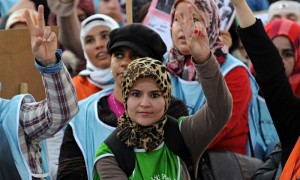The Guardian
Emmanuelle Jardonnet
Théâtre Aquarium is hidden away in a poor quarter of Rabat, in a street where washing dries in the sun. Step inside its cramped premises and you find yet another washing line, strung across the stage. Hanging from it, in some improbable attempt at festive decoration, are women’s underpants for all sizes and ages. This is all that there is in the way of scenery for the play Dialy, which means “mine” in Moroccan Arabic. It is a euphemism for “vagina”, a word they could hardly have put on the flyers.
The play shatters the taboo of women’s sexuality in Morocco with a burst of liberating laughter and has prompted much controversy since it launched in 2012. We visited the theatre on a Saturday morning and met the three players and director Naima Zitan.
Something has happened with this play: Moroccan audiences are dying to see something genuine for a change.
Naima Zitan, director, Dialy
Farida Elbouazaoui, Nouria Benbrahim and Amal Benhaddou, all in their early 30s, have often worked for the militant theatre group, which seeks “to defend the rights of women in particular and humans in general”, in the words of Abdellatif Oulmakki, its only male operative. This being said, the three actresses admit that they were “afraid” when Dialy opened, and the echo of their first performances reached the most conservative, or indeed radical, ears.
“We received insults and threats on the social media. In particular there were calls to murder us, on a Facebook page, which got 5,000 ‘likes’,” they recall. “Even in the art world some people disapproved of this subject. Acquaintances advised us to stop, to avoid getting into trouble, but we carried on.” Zitan adds: “Something has happened with this play. Moroccan audiences are dying to see something genuine for a change.”
Dialy is a rarity for two reasons: because it is quite unique in Morocco, but also because it is hard to catch, very few venues being prepared to brave the scandal of the Moroccan version of the Vagina Monologues. Since it was first staged, thanks to funding from the Institut Français, it has only been performed about 20 times. It has played twice since the beginning of 2015, once at the Studio des Arts Vivants in Casablanca; once at the Institut du Monde Arabe (IMA) in Paris.
On both occasions there was controversy. The two organisations received threats of legal action from lawyers representing the author of the Monologues, Eve Ensler, demanding that they cancel the show. Ensler’s legal representatives alleged that the status of Dialy, quite openly inspired by the 1996 play, needed to be clarified. Initially the Moroccan show aimed to be an adaptation. In preparation the Aquarium organised a string of encounters and workshops to foster “female self-expression”, with contributions from about 150 women.
Following this a preliminary text was submitted to Ensler. As this application was not accepted, the troupe opted to use a completely new and original text by Maha Sano on the same subject.
At Casablanca and in Paris heated negotiations were required to ensure the play was performed. On 14 March the performance finally got the go-ahead, thanks to the persistence of Nezha Belkady, director of theatre at Studio des Arts Vivants. “I’ve never said the word ‘vagina’ so many times as I did that week,” she said in an interview, admitting that it was easier to say in French than in Arabic.
“This play says out loud what women here scarcely dare to think,” she added, explaining that she “was really bowled over by the show and the courage of these women representing all their Moroccan sisters”.
It was much the same story at the IMA in Paris. The original date in March had to be cancelled, but the play was finally performed in April. “We are now convinced that there are no intellectual property issues with this text,” says David Bruckert, the institute’s general secretary.
This play says out loud what women here scarcely dare to think
Nezha Belkady, director of theatre at Studio des Arts Vivants
On the night in Casablanca a crowd of curious urbanites filled the 600-seat theatre. They laughed and applauded, despite the often black humour. Weighty traditions preside over every stage of a woman’s life: her first menstrual cycle, marriage, pregnancy, giving birth, even marital rape. Such is the tension that even the knickers on the washing line quiver.
The parts that are sung are among the funniest: the moment on the wedding night when the bride’s bloodstained sheet is exhibited as proof of her virginity, in an outburst of fierce family jubilation; the trip to the Turkish bath the night before the wedding, which degenerates into a cabaret romp; and finally they exorcise the unmentionable word, singing out: “It’s name is taboune” [in literary Arabic and the local dialect]. And in so doing the unmentionable is rehabilitated, once more their own.
After the show the response is unanimous. “It’s spare, minimalist but the emotion is there,” says anthropologist Abelbaki Belfkih. “From childhood to old age, you can see that women’s sexuality must conform to a social rationale. There is a collective, coercive leitmotiv. Revealing it is an antidote.”
“These traditions are present throughout society,” says Ismaïl, 29. “The play should be staged in many more places.”
This article appeared in Guardian Weekly, which incorporates material from Le Monde








